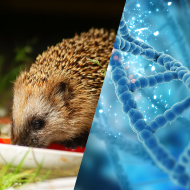Genomes of British wildlife life to be mapped

The project will see teams collect and barcode around 8,000 key British species
The £9.4m funding from the Wellcome Sanger Institute will support 10 institutions to launch the first phase of sequencing all the species on the British Isles. This will see teams collect and barcode around 8,000 key British species, and deliver high-quality genomes of 2,000 species.
This work will act as a launch pad for a larger ambition to sequence all species on Earth. Exploring the genomes of these organisms will give an unprecedented insight into how life on Earth evolved and uncover new genes, proteins and metabolic pathways – as well as new medicines for infectious and inherited diseases.
And at a time when many species are under threat from climate change and human development, these data will also help characterise, catalogue and support conservation of global biodiversity for future generations.
From the small fraction of the Earth’s species that have been sequenced, enormous advances have been made in knowledge and biomedicine. From plants, a number of life-saving active agents have been discovered, which are now being created in the laboratory – artemisinin for malaria and taxol for cancer, for example.
The consortium of 10 research institutes, museums and associated organisations ultimately aims to sequence the genetic code of 60,000 species that live in the British Isles. They are:
- University of Cambridge
- Earlham Institute (EI)
- University of Edinburgh
- EMBL’s European Bioinformatics Institute (EMB-EBI)
- The Marine Biological Association (Plymouth)
- Natural History Museum
- Royal Botanic Gardens, Kew
- Royal Botanic Garden Edinburgh
- University of Oxford
- Wellcome Sanger Institute
These data will be of enormous value to the international scientific community, including those working in life sciences, medicine, alternative energy and climate research. The data will also act as a global resource for public engagement experts, naturalists, citizen scientists, university students and schools.
Professor Mark Blaxter, Lead of the Tree of Life Programme at the Wellcome Sanger Institute, said: “The Darwin Tree of Life Project will change biology forever, delivering new insights into the numerous animals, plants, fungi and protists that call the British Isles home. The impact of this work will be equivalent to the effect the Human Genome Project has had on human health over the last 25 years.”



 HMRC has invited feedback to its communications regarding the employment status of locum vets and vet nurses.
HMRC has invited feedback to its communications regarding the employment status of locum vets and vet nurses.